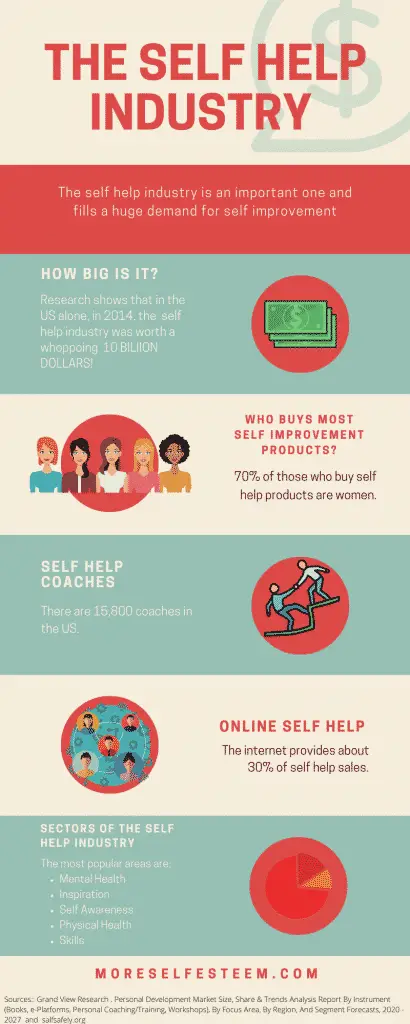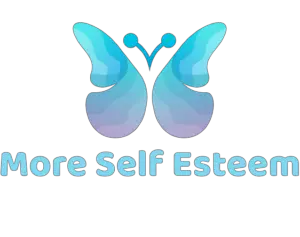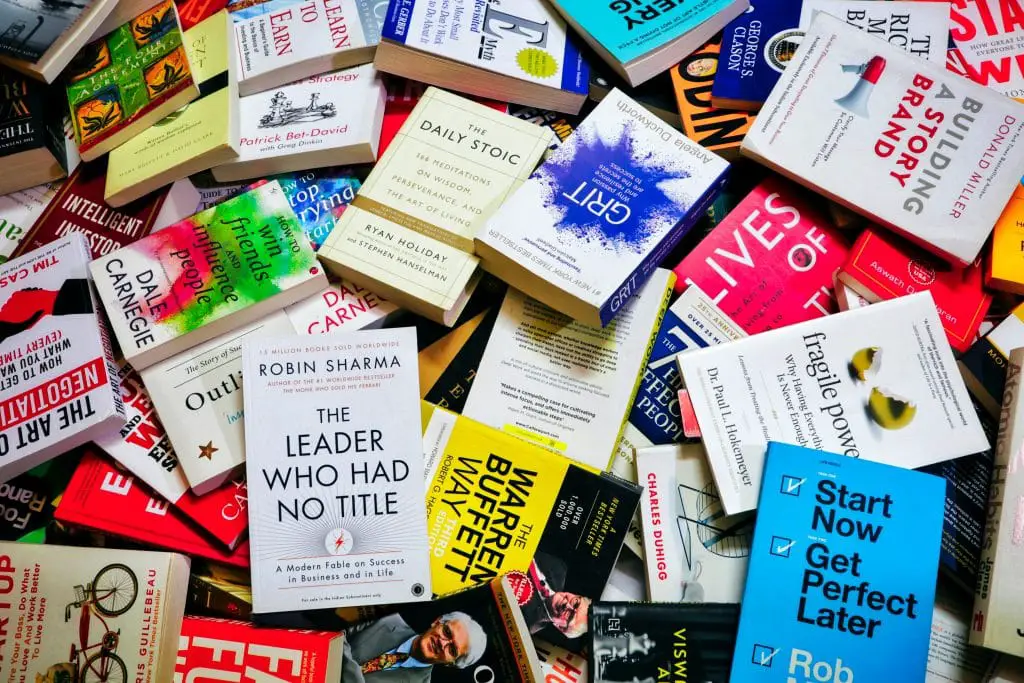Self help is a big business, worth approximately $10 billion in the US alone (according to MarketData Enterprise’s 2015 report, “The Market for Self-improvement Products and Services.”) With so much demand for products that help with self improvement, there is obviously a need. But, do these products actually help?
I have a great deal of experience in the self help field, having written a popular book about self esteem and having written hundreds of articles about the topic on this and other websites since 1998. I am also a qualified Life Coach, so I am able to advise you on the best use of self help tools. On this page, I aim to suggest how best to use self help resources, and whether they can actually help you to build self esteem. But first, what exactly is self help and how can it help you?
Self help is a tool that can support you in building your self esteem. It includes books, audiobooks, courses, podcasts, hypnosis, meditation and other tools available both online and offline. These tools offer guidance and teach you valuable strategies to use, but cannot replace profession therapy or counselling.
Self help is a form of self-learning and is very helpful in improving your self esteem and confidence. In fact, according to Ruth Cigman, in an article published in the Journal of Philosophy of Education in 2004, self esteem is one of the central themes of self help. This is not, however, the view of everyone who has researched the best ways to treat low self esteem, (again according to Cigman, 2004). As a teacher, life coach and self help author I will try to answer some of these questions and help you decide whether self help is the best course for you to build self esteem, so keep reading!
The most important aims of self-help are to enable you to understand what you want out of life, develop and encourage a positive attitude, and show you how to live the life you seek. It should be clear to you that this will require effort and hard work on your part. No self-improvement book, course or personal coach can work magic!
Persistence is very important if self help is to work for you. Success is rarely instant, although you may be able to see rapid improvement by making small changes to your behaviour or thinking. To make permanent improvement you have to work hard and be persistent in your efforts.
Building self-esteem and maintaining it requires that you incorporate your learning into your life until it becomes habit-forming.
Does Self Help Work? Can it Help You Build Self Esteem?
Over the years I’ve received a number of emails saying: “I’ve read books, I’ve tried self help programs yet I can’t seem to make progress…” It seems to be quite a common complaint. Is there a real problem with self help materials or are there things you can do to help yourself make progress in self improvement?
There are many different opinions on this. For example, this study into the use of self help materials for smokers trying to give up smoking concluded that, for those that had no other help, it did help but results were varied.
This study of 40 different self help treatments found that some problems such as depression, sleep disorders, fear and skills development were suitable for self help treatments while others were less so. The study also links success with consistent application of the self help principles included in the course, book or whichever tool was used.
There are doubters too, those who like Mickie McGee, who is critical of the self help industry and its promises of self-improvement (see his book, Self-Help, Inc.: Makeover Culture in American Life).
There are some, like Thomas Powell, who believe that self help can be useful in conjunction with other treatments. This seems quite logical, as self help tools can encourage us, motivate us and inspire us. I know I have read many inspiring books that I believe have changed the way I think about life. Perhaps you have experienced this too?
Here is my answer based on years of personal experience with self help materials
I would argue that the strongest evidence for the success of self help is that it inspires us to be better and to seek the best in ourselves and the world. I advise you to give self help a try if you haven’t already and see if it works for you.
There is hope. If you’ve bought books or courses that have promised you sweeping changes and big improvements in your life then studied them closely only to find that at the end you are no better off than you were at the start…
You need to look at why this happens.
The problem is not with the material you have bought, (there is some rubbish out there, but the vast majority of books and courses at least contain something that can help you), the problem might be your determination and application. Here are a few mistakes we all fall into. Which ones have stopped you from succeeding?
Check out more about why self help is the best help you can give yourself.
The Magic Wand And The Promise of Change
When you see that new book offering you the promise of a huge change in your life, it is tempting to think that all you need do is buy it, read it and you’ll be changed forever. Ever found yourself believing that?
No book or course is a magic wand! Nothing can change you except you. A book or course can change your way of thinking or motivate you to change, but you decide whether or not to allow yourself to change. You have to make the commitment and apply yourself. No change comes easily.
This “magic wand” approach sets many people up to fail before they have even opened their carefully chosen self help book.
Don’t fall into this trap. The book or course is a guide, a tool which can help you only if you allow it to.
Helpful Tools

In order to improve you need guidance and quality sources of information. The obvious sources are self esteem books and articles on the internet.
My website, has a huge amount of information you can benefit from. But, there are other tools and resources you might want to try such as:
- Courses to build your self esteem and confidence.
- Videos which can explain and inspire, available from YouTube and other places online. Take a look at my YouTube channel here.
- Support from friends and family is a big plus and can really help you in difficult times.
- Professional help from a therapist, psychologist, counsellor or life coach.
- Affirmations and visualization techniques can be useful to encourage positive thinking on a daily basis.
- Relaxation techniques for when you face stressful challenges in your professional and personal life.
- Download popular self hypnosis audios – highly recommended! This natural and safe method has worked for thousands of visitors to this website and also has helped me personally.
- Motivational audiobooks and books can inspire you and teach you new ways of thinking and behaving which can open up new possibilities for you.
- Inspirational quotes are always helpful. They can motivate you and remind you that you have the possibility and the choice to better live your life.
- Your faith – the Bible, The Koran or the Torah – they are all great sources of wisdom and comfort and, as some have said, are self help books with a long history of influence and success.
- Online websites offer a great deal of helpful material that can transform you. Here’s a great positive psychology site I really like with some great articles to check out.
- Meditation is an amazing and ancient tool used by many thousands all over the world to relieve stress, calm your inner self and become more self aware. Check out this page to find out more about how meditation can help you build your self esteem.
How to Maximize the Effectiveness of Self Help Tools
The effectiveness of these tools varies from person to person, after all we are all different. The truth is you won’t know until you try. You might prefer listening to audiobooks in your spare time. For others hypnosis could be the answer. Just try something and give it your best shot!
Furthermore, I advise you to focus on one thing at a time – focus is all important. Most self help materials require you to follow steps, so don’t give up too early or get distracted. These resources bring maximum benefit when you devote time and act persistently. There are no short cuts, this is a journey, the aim of which is your improvement on the way to becoming a better person.
“Nourishing yourself in a way that helps you blossom in the direction you want to go is attainable, and you are worth the effort. “
– Deborah Day
Top Tips on How to Succeed with Self Help
It is not easy to change or improve. As with most challenges you get out only as much as you put in. However, it is important that you do everything possible to avoid these dangers and negative impacts of poor self esteem.
The first, and most essential step in following any self help course or book successfully, is said to be being completely honest with yourself (Rimke, 2000).
Beware of rushing through self help books and courses, and then giving up to try something else. I suggest you take your time and be careful choosing the tools you need, thinking about what will most help you to build your self esteem and confidence. Once you’ve made your decision, you must give your best efforts to only the best books or courses available, (such as those I recommend throughout in this website). Do not give up, decide you will follow any suggestions wholeheartedly.
Don’t forget to deal with stress in your life, as that affects so many areas and will certainly eat away at your energy and motivation levels.
Problems and Challenges to Your Self-Help Success
The most common problem people suffer from is getting stuck in analyzing themselves. Most courses or books concentrate on understanding your situation and your problem because self awareness is very important. This is great, but sometimes it is easy to spend too much time on this when you would be better off spending your time to try and improve the situation.
Do not fall into the trap of using excuses to put off starting the program. Do not, on the contrary, rush through the course or book but take it slowly ensuring you devote enough time to each exercise. You should work through each part before moving onto the next. If you have friends or family who are reading the same book or going through a similar course, take time to discuss what you’ve learned and to share thoughts with them to reinforce all the new information!
If you follow these suggestions, I am certain you will succeed. Feel free to send me a message to let me know how you find the resources I provide or if you have any questions!
Confidence Is So Important
I highly recommend you check out the amazing Build Your Self Confidence course by Uncommon Knowledge. It’s quick and easy, and I guarantee your confidence will skyrocket in a matter of days. The course is prepared by experienced psychologists and the downloads are tailored to help you on the road to increased confidence and esteem. I’ve personally tried the course out and recommend it to you only because I know it works.
You have the power of change within you!
To avoid common problems and succeed in building your self-esteem, my advice is to use only quality resources, then its up to you to get the most from them. To change you must decide and act – its as simple as that.
One word of caution, the problems we discuss on this website may be made worse by depression and so if you suffer from this make sure you do not ignore it. My other website, all about how to deal with and overcome depression will help you.
Try some of the courses or books I suggest, digest the information and give it 100%, trust me you will succeed! This website focuses on self-esteem and confidence, two areas which you can improve if you decide to put in the effort.
Recommended for You
Try this amazing self-hypnosis download – will inspire you to build your esteem now!
References
- Cigman, R. (2004). Situated self‐esteem. Journal of Philosophy of Education, 38(1), 91-105. https://onlinelibrary.wiley.com/doi/full/10.1111/j.0309-8249.2004.00365.x
- Gould, R. A., & Clum, G. A. (1993). A meta-analysis of self-help treatment approaches. Clinical psychology review, 13(2), 169-186.
- Lancaster T, Stead L.F. (2005). Self‐help interventions for smoking cessation. Cochrane Database of Systematic Reviews, Issue 3. Art. No.: CD001118. DOI: 10.1002/14651858.CD001118.pub2.
- MarketData Enterprise. (2015). The Market for Self-Improvement Products and Services. https://www.marketdataenterprises.com/wp-content/uploads/2014/01/SI-Market-2015-TOC.pdf
- McGee, M. (2005). Self-help, Inc.: Makeover culture in American life. Oxford University Press on Demand.
- Powell, T. J. (1987). Self-help organizations and professional practice. National Association of Social Work.
- Rimke, H.. (2000). GOVERNING CITIZENS THROUGH SELF-HELP LITERATURE. Cultural Studies, 14:1, 61-78, DOI: 10.1080/095023800334986

